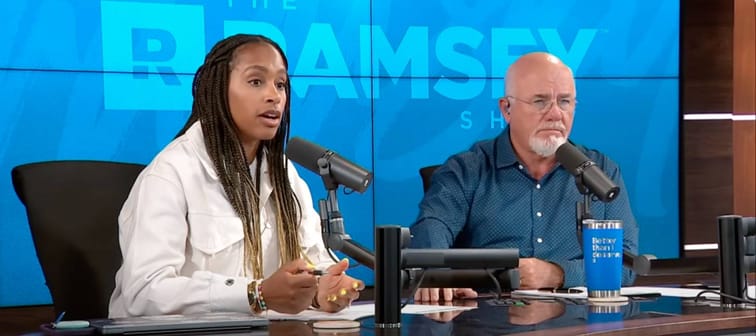Grandma wants to take money from grandkids’ accounts
Ramsey Show Co-host Jade Warshaw posed an alternative suggestion.
“Why doesn’t she lend him the $3,000?” she asked the caller, referring to Andrea’s mother.
“Because she doesn’t have the money,” Andrea replied.
Dave Ramsey’s response? “Neither do you. You're broke and in debt.”
But the plot thickened when Andrea revealed her mother’s solution: tapping into Andrea’s children's savings.
“I talk to my mom sometimes, telling her we save money for the kids, right? So her idea was to take the money from the kid's savings account to give my brother the $3,000,” she said.
“She has a lot of ideas about what you should do with your money,” Warshaw noted, “Do you feel like you have to listen to what she’s asking you to do?”
Andrea hesitated, noting her brother once helped her early in her marriage, but that support came in the form of small items for her kids.
“That was not $3,000. That was a hundred dollars,” Ramsey said. “Because I got to tell you in my world, when grandma asked for the kids' money for the brother, that means grandma needs to be smacked.”
Originally from Ecuador, Andrea noted that extended family support is a common expectation in her community.
Ramsey responded, “In your culture, it is more normal to share with extended family … but this is your household. And your household is separate.”
Cultural norms can shape financial habits, but limits are limits. Even with that understanding, Andrea expressed hesitation.
“My brother is more … resentful. If you tell him something that he doesn’t like … then he’s not going to talk to me,” she told the hosts.
She feared that saying no would lead to tension or silence.
“There’s no consequence here other than adults choosing how they’re going to behave next. If your brother gives you the cold shoulder, that’s not something you can control,” Warshaw said. “All you can control is your response.”
Andrea admitted that her mom would likely try to persuade her.
Ramsey’s response was simply, “No is a complete sentence.”
He suggested that Andrea tell her mother, “Mom, I love you. I love him. That’s not in question. But this money is set aside for my children. And the answer is going to be no, no matter how long we talk.”
Invest in real estate without the headache of being a landlord
Imagine owning a portfolio of thousands of well-managed single family rentals or a collection of cutting-edge industrial warehouses. You can now gain access to a $1B portfolio of income-producing real estate assets designed to deliver long-term growth from the comforts of your couch.
The best part? You don’t have to be a millionaire and can start investing in minutes.
Learn MoreWhat to do when money comes between family
Financial experts emphasize the importance of setting clear boundaries in similar scenarios. According to a survey by Ipsos for BMO, 34% of partnered Americans report that money is a source of conflict in their relationships. Money issues with extended family can add to that stress.
Here are some tips to navigate tricky situations like these:
-
Start with an open conversation. Schedule time to sit down and talk about your concerns without placing blame. For instance, Andrea could say, "I understand your situation, but I need to prioritize my children's future savings."
-
Establish firm boundaries. Don’t be afraid to set your limits and let your family know that they need to respect them.
-
Offer different types of support. Look for other ways to help, such as recommending resources or financial counseling services that may be useful.
Finally, if the conversation doesn’t seem to be progressing, consider involving a neutral third party, such as a financial advisor, to help facilitate.
It can be tough, but by approaching the situation with firm boundaries, it's possible to maintain family relationships while also protecting your financial well-being.
The richest 1% use an advisor. Do you?
Wealthy people know that having money is not the same as being good with money. WiserAdvisor can help you shape your financial future and connect with expert guidance. A trusted advisor helps you make smart choices about investments, retirement savings, and tax planning.







